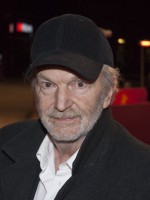Rolf Schübel est un Acteur, Réalisateur et Scénariste Allemand né le 11 novembre 1942 à Stuttgart (Allemagne)

Rolf Schübel (born 11 November 1942 in Stuttgart, Germany) is a German film director and screenwriter.
Schübel studied literature and sociology during the 1960s, first in Tübingen, and later in Hamburg. There he met filmmaker Theo Gallehr and assisted at his documentary Landfriedensbruch (1967). However, the film was not shown in television but went directly to the film archives; the NDR (North German Broadcasting Studios) as employer refused to broadcast the film because it’s statement was viewed as to radical.
Nevertheless, Gallehr and Schübel produced a number of films for the NDR and WDR afterwards. For their documentary Der deutsche Kleinstädter (1968) they received the Adolf Grimme Award, as well as for Rote Fahnen sieht man besser (1971) concerning the closure of a chemical plant in Krefeld.
In 1972 Schübel founded his own production company. In the following years he created the film portraits Nachruf auf eine Bestie (1983) concerning the child murderer Jürgen Bartsch and Der Indianer (1987) about a man with laryngeal cancer. The film was based on the autobiographical tale of Leonhard Lenz. Both films received various awards.
His first feature film directed Schübel in 1990 with Das Heimweh des Walerjan Wróbel. The film tells the story of a Polish teenager under the regime of forced labor in Germany during World War II in northern Germany and who was later was sentenced to death by the Nazi regime for a minor misdemeanor.
Schübel's international breakthrough came with the 1999 film Ein Lied von Liebe und Tod (Gloomy Sunday — A Song of Love and Death; it is set in Budapest of the 1930s and tells the story of a woman (Erika Marozsán) between three men (Joachim Król, Ben Becker and Stefano Dionisi). Background is the popular title melody, which was kind of an anthem for suicides during its time. The film won various awards among others the Deutscher Filmpreis, the Bayerischer Filmpreis (Best Feature Film), an honorable mention from the international 2000 Jerusalem Film Festival, the 2000 Audience Award at the São Paulo International Film Festival, and the Audience Choice Award at the St. Louis International Film Festival.
In 2001 he wrote and directed the psychodrama Collapse with Sebastian Koch as a journalist who questioned his job critically. In 2002 he directed the drama Blueprint with Franka Potente. In 2004 he made the drama Zeit der Wünsche. In 2006 and 2007 he made episodes for Tatort.
Source : Wikidata
Rolf Schübel

- Infos
- Photos
- Meilleurs films
- Famille
- Personnages
- Récompenses
Schübel studied literature and sociology during the 1960s, first in Tübingen, and later in Hamburg. There he met filmmaker Theo Gallehr and assisted at his documentary Landfriedensbruch (1967). However, the film was not shown in television but went directly to the film archives; the NDR (North German Broadcasting Studios) as employer refused to broadcast the film because it’s statement was viewed as to radical.
Nevertheless, Gallehr and Schübel produced a number of films for the NDR and WDR afterwards. For their documentary Der deutsche Kleinstädter (1968) they received the Adolf Grimme Award, as well as for Rote Fahnen sieht man besser (1971) concerning the closure of a chemical plant in Krefeld.
In 1972 Schübel founded his own production company. In the following years he created the film portraits Nachruf auf eine Bestie (1983) concerning the child murderer Jürgen Bartsch and Der Indianer (1987) about a man with laryngeal cancer. The film was based on the autobiographical tale of Leonhard Lenz. Both films received various awards.
His first feature film directed Schübel in 1990 with Das Heimweh des Walerjan Wróbel. The film tells the story of a Polish teenager under the regime of forced labor in Germany during World War II in northern Germany and who was later was sentenced to death by the Nazi regime for a minor misdemeanor.
Schübel's international breakthrough came with the 1999 film Ein Lied von Liebe und Tod (Gloomy Sunday — A Song of Love and Death; it is set in Budapest of the 1930s and tells the story of a woman (Erika Marozsán) between three men (Joachim Król, Ben Becker and Stefano Dionisi). Background is the popular title melody, which was kind of an anthem for suicides during its time. The film won various awards among others the Deutscher Filmpreis, the Bayerischer Filmpreis (Best Feature Film), an honorable mention from the international 2000 Jerusalem Film Festival, the 2000 Audience Award at the São Paulo International Film Festival, and the Audience Choice Award at the St. Louis International Film Festival.
In 2001 he wrote and directed the psychodrama Collapse with Sebastian Koch as a journalist who questioned his job critically. In 2002 he directed the drama Blueprint with Franka Potente. In 2004 he made the drama Zeit der Wünsche. In 2006 and 2007 he made episodes for Tatort.
Le plus souvent avec
Filmographie de Rolf Schübel (4 films)
Acteur

Querelles de clocher (2012)
, 1h24Genres Comédie
Acteurs Natalia Wörner, Karoline Eichhorn, Rolf Schübel
Rôle Rolf Merz
Note61%





Les villages d'Oberrieslingen et d'Unterrieslingen se touchent, partagent la même église et le même cimetière. Et se vouent une haine ancestrale qui n'attend qu'un événement malheureux pour s'embraser. L'accident de mobylette de Mamie Annie met le feu aux poudres. L'infortunée a été projetée ad patres par un nid de poule situé à la jonction des deux villages. Alors, à qui en incombe la faute ? Les funérailles tournent au drame, au grand dam de Klara et de Peter, follement amoureux l'un de l'autre. Klara est viticultrice à Oberrieslingen, Peter, éleveur de cochons à Unterrieslingen. Et ils auraient convolé depuis belle lurette sans ces querelles de clocher.
Réalisateur

Blueprint (2003)
, 1h48Réalisé par Rolf Schübel
Genres Drame, Science-fiction
Thèmes Clonage, Adaptation d'une œuvre littéraire de science-fiction
Acteurs Franka Potente, Ulrich Thomsen, Justus von Dohnányi, Hendryk Duryn
Note55%





Iris Sellin (Potente) is a world-famous pianist and composer who finds out that she is suffering from multiple sclerosis, a degenerative nerve disorder that will gradually stop her being able to perform. She asks a friend Dr. Martin Fisher (Thomsen), a revolutionary reproductive researcher, to assist her in creating her clone so that she can pass her music onto her daughter. Even though cloning of humans is illegal, Dr. Fisher agrees so that he will forever be known as the first. The procedure is a success and Iris gives birth to Siri (Potente). Siri closely resembles her mother in both facial features and musical talent.
 , 1h52
, 1h52Réalisé par Rolf Schübel
Genres Drame, Romance
Thèmes La musique, Musique
Acteurs Erika Marozsán, Joachim Król, András Bálint, Stefano Dionisi, Denis Moschitto, Sebastien Koch
Note77%





In the present day, German industrialist, Hans Wieck returns to Budapest with his family on the occasion of his 80th birthday having been stationed there during World War II. During dinner at his favorite restaurant, Szabo's, Hans regales his family and friends with stories of his many visits to the restaurant before and during the war. As he relishes his favorite dish, "Beef Rolls" he suddenly collapses with the song "Gloomy Sunday" being played, at his request, by two musicians. As he dies he sees a portrait of a beautiful woman taken many years before. The film then flashes back to Budapest during the late 1930s.
 , 1h35
, 1h35Réalisé par Rolf Schübel
Genres Drame
Acteurs Artur Pontek, Michael Gwisdek, Eberhard Fechner, Leon Niemczyk
Note60%





Scénariste
 , 1h52
, 1h52Réalisé par Rolf Schübel
Genres Drame, Romance
Thèmes La musique, Musique
Acteurs Erika Marozsán, Joachim Król, András Bálint, Stefano Dionisi, Denis Moschitto, Sebastien Koch
Note77%





In the present day, German industrialist, Hans Wieck returns to Budapest with his family on the occasion of his 80th birthday having been stationed there during World War II. During dinner at his favorite restaurant, Szabo's, Hans regales his family and friends with stories of his many visits to the restaurant before and during the war. As he relishes his favorite dish, "Beef Rolls" he suddenly collapses with the song "Gloomy Sunday" being played, at his request, by two musicians. As he dies he sees a portrait of a beautiful woman taken many years before. The film then flashes back to Budapest during the late 1930s.
 , 1h35
, 1h35Réalisé par Rolf Schübel
Genres Drame
Acteurs Artur Pontek, Michael Gwisdek, Eberhard Fechner, Leon Niemczyk
Note60%





 Connexion
Connexion

